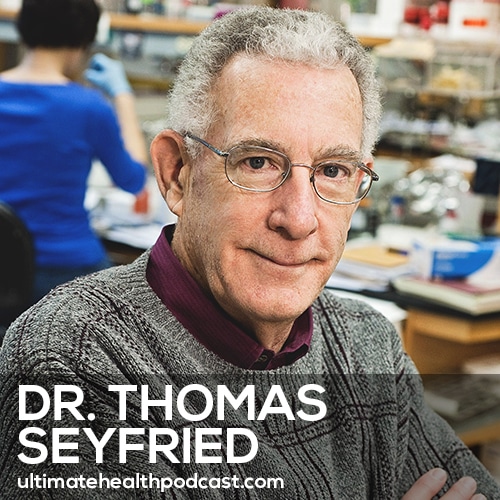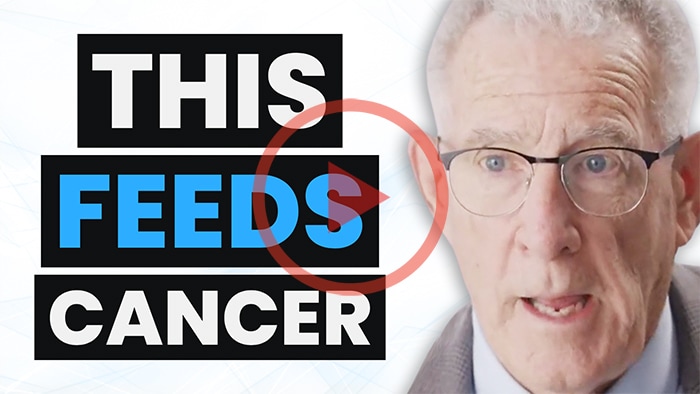
Thomas N. Seyfried (IG: @thomasseyfriedbc) is Professor of Biology at Boston College, and received his Ph.D. in Genetics and Biochemistry.
He has over 200 peer-reviewed publications and is author of the book, Cancer as a Metabolic Disease: On the Origin, Management, and Prevention of Cancer.
If you or someone you know has cancer, you’ll definitely want to tune in and learn about this alternative way of treating the disease.
↓ Click the graphic below to watch the full conversation on YouTube ↓

In this episode, we discuss:
- Are less people really dying of cancer these days?
- Treat cancer as a metabolic disease, not a genetic disease
- The biggest challenges getting cancer research recognized
- Metabolic therapy vs. standard of care
- Treating brain tumors with metabolic therapy
- How to measure your glucose ketone index (GKI)
- Cancer loves glucose and glutamine
- Genetic mutations aren’t the cause of cancer
- The primary role of ketone bodies
- What is Insulin Potentiation Therapy (IPT)?
- The growth of cancer cells
- Are exogenous ketones being used as an adjunct to therapy?
- The press-pulse strategy for glutamine
- Administering low-dose drugs under therapeutic ketosis
- The standard of care for cancer is not working
- Water fasting vs the keto diet/drug combo
- Learning to manage cancer without recurrence
- What is the DON? + How the press/pulse strategy works
- Metabolic therapy isn’t getting a fair clinical trial
- The future of cancer
- Cancer is a massive tragedy for humanity
- Can cancer screening be non-invasive?
- How to prevent cancer
Show sponsor:
Organifi <== 20% off all Organifi products by using the code ultimatehealth at checkout
Paleovalley <== 15% off all Paleovalley products by using the code ultimatehealth15 at checkout
LMNT <== Claim your free LMNT Sample Pack when you make any purchase
Related links:
Dr. Thomas Seyfried – Cancer as a Metablic Disease (book)
Dr. Thomas Seyfried’s website
Follow Dr. Thomas Seyfried on Instagram and Twitter
Dr. Thomas Seyfried – Boston College (Research Publications)
MD Anderson Cancer Center
Memorial Sloan Kettering Cancer Center
Dana–Farber Cancer Institute
Cancer Revolution (documentary)
Pablo Kelly
Glucose Ketone Index (GKI)
Dr. Otto Warburg
Listen to Dr. Dominic D’Agostino previously on TUHP (episode #133)
Dr. Dominic D’Agostino
Guy Tenenbaum & Fred Evrard – Can We Heal From Cancer? (book)
Related episodes:
The Main Causes of Cancer & What You Can Do to Prevent It (New Paradigm) | Dr. Jason Fung (#510)
How I Cured Stage 3 Colon Cancer in 4 Months | Fred Evrard (#505)
What to Eat to Starve Cancer & Heal the Body | Dr. William Li (#469)
280: Dr. Josh Axe – Keto Diet • Treating Cancer With Food • Collagen Is Essential
276: Chris Wark – Chris Beat Cancer • Toxic Emotions Suppress Immunity • Gratitude Is The Secret To Happiness
Note: Some of the links above are affiliate links. Making a purchase through these links won’t cost you anything but we will receive a small commission. This is an easy, free way of supporting the podcast. Thank you!
How can you support our podcast?
1. Apple users, please subscribe and review our show on Apple Podcasts, we make sure to read them all. Android users, be sure to subscribe to our show on Google Podcasts. Subscribers never miss any of the action 😉
2. If you’d prefer to watch vs listen to the interviews, head over to our YouTube channel and enjoy the full video conversations. Be sure and subscribe while you’re there.
3. Tell a friend about The Ultimate Health Podcast. They will surely thank you later. You can use the envelope button below to email a friend or tell them about TUHP in person.
4. Follow our adventures on our favourite social media platform, Instagram.
5. Download The Ultimate Health Podcast app (FREE). This way you’ll have our whole library of episodes right at your fingertips. Download our iOS/Apple app or our Android app.
6. Share using the buttons below.
Thank you!









He mentioned clinics embracing the metabolic protocol…Are there ANY clinics that administer this medical drug protocol in the USA?
Where are the links to his papers mentioned in the interview?